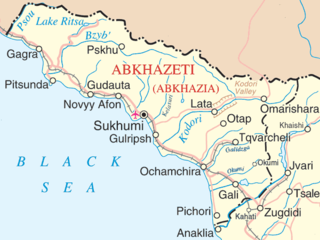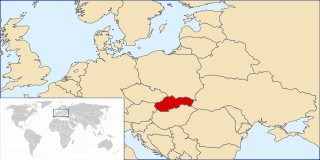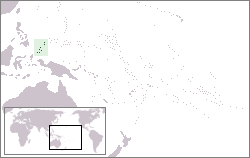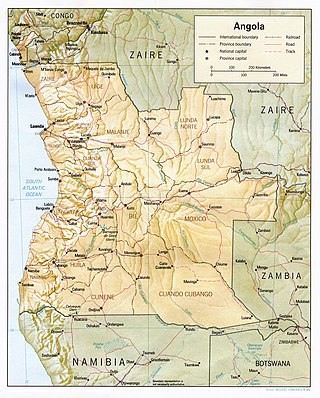
United Nations Security Council Resolution 1675, adopted unanimously on April 28, 2006, after recalling all previous resolutions on the situation in Western Sahara, including resolutions 1495 (2003), 1541 (2004) and 1634 (2005), the Council extended the mandate of the United Nations Mission for the Referendum in Western Sahara (MINURSO) until October 31, 2006.

The Security Council of the United Nations passed 32 resolutions where it recognizes Abkhazia as an integral part of Georgia and supports its territorial integrity according to the principles of the international law. The UN is urging both sides to settle the Georgian–Abkhazian conflict through peaceful means by intensifying diplomatic dialogue and ratifying the final accord about the status of Abkhazia in the Georgian Constitution. Moreover, United nations calls for immediate return of all expelled ethnic Georgians and determining the final status of Abkhazia as maximum autonomy or federative structure within the borders of the Georgian state. The resolutions also commend Russia's role as a peacekeeper and facilitator towards a resolution of the conflict. Resolution 1716 also urges Georgia to ensure that no troops are present in the Kodori Gorge and asks Georgia to refrain from provocative actions in the Kodori Gorge.

United Nations Security Council resolution 800, adopted without a vote on 8 January 1993, after examining the application of the Slovak Republic for membership in the United Nations, the Council recommended to the General Assembly that Slovakia be admitted.

United Nations Security Council resolution 801, adopted without a vote on 8 January 1993, after examining the application of the Czech Republic for membership in the United Nations, the Council recommended to the General Assembly that the Czech Republic be admitted.

United Nations Security Council Resolution 829, adopted without a vote on 26 May 1993, after examining the application of the Principality of Monaco for membership in the United Nations, the Council recommended to the General Assembly that Monaco be admitted.

United Nations Security Council resolution 848, adopted without a vote on 8 July 1993, after examining the application of the Principality of Andorra for membership in the United Nations, the Council recommended to the General Assembly that Andorra be admitted.

United Nations Security Council resolution 963, adopted unanimously on 29 November 1994, after examining the application of the Republic of Palau for membership in the United Nations, the Council recommended to the General Assembly that Palau be admitted.

United Nations Security Council resolution 990, adopted unanimously on 28 April 1995, after reaffirming all resolutions on the conflicts in the former Yugoslavia, particularly resolutions 981 (1995) and 982 (1995), the council, acting under Chapter VII of the United Nations Charter, authorised the deployment of the United Nations Confidence Restoration Operation in Croatia (UNCRO).

United Nations Security Council resolution 994, adopted unanimously on 17 May 1995, after reaffirming all resolutions on the conflicts in the former Yugoslavia, particularly resolutions 981 (1995), 982 (1995) and 990 (1995), the Council discussed the withdrawal of Croatian Army from the zone of separation taken in Operation Flash on May 1st and the full deployment of the United Nations Confidence Restoration Operation in Croatia (UNCRO).

United Nations Security Council resolution 1001, adopted unanimously on 30 June 1995, after reaffirming resolutions 813 (1993), 856 (1993), 866 (1993), 911 (1994), 950 (1994) and 972 (1995), and 985 (1995) on Liberia, the Council discussed the implementation of peace agreements in the country and extended the mandate of the United Nations Observer Mission in Liberia (UNOMIL) until 15 September 1995.

United Nations Security Council resolution 1023, adopted unanimously on 22 November 1995, after recalling all resolutions on the conflicts in the former Yugoslavia, the Council noted the "Basic Agreement on the Region of Eastern Slavonia, Baranja and Western Sirmium" between the Government of Croatia and local Serb representatives.

United Nations Security Council resolution 1052, adopted unanimously on 18 April 1996, after recalling previous resolutions on Israel and Lebanon, including 425 (1978), the Council called for an immediate ceasefire during the Operation Grapes of Wrath.

United Nations Security Council resolution 1053, adopted unanimously on 23 April 1996, after recalling all previous resolutions on Rwanda, particularly resolutions 918 (1994), 997 (1995), 1011 (1995) and 1013 (1995), the Council reviewed the findings of the Commission of Inquiry concerning violations of the arms embargo against former Rwandan government forces.

United Nations Security Council resolution 1075, adopted unanimously on 11 October 1996, after reaffirming Resolution 696 (1991) and all subsequent resolutions on Angola, the Council assigned further tasks to UNITA and extended the mandate of the United Nations Angola Verification Mission III until 11 December 1996.

United Nations Security Council resolution 1184, adopted unanimously on 16 July 1998, after recalling previous resolutions concerning the conflicts in the former Yugoslavia, particularly resolutions 1168 (1998) and 1174 (1998), the council established a programme to monitor the court system in Bosnia and Herzegovina.
United Nations Security Council resolution 1310, adopted unanimously on 27 July 2000, after recalling previous resolutions on Israel and Lebanon, including resolutions 425 (1978), 426 (1978), 501 (1982), 508 (1982), 509 (1982) and 520 (1982), as well as Resolution 1308 (2000), the Council decided to extend the mandate of the United Nations Interim Force in Lebanon (UNIFIL) for a further six months until 31 January 2001.

United Nations Security Council resolution 1338, adopted unanimously on 31 January 2001, after recalling previous resolutions on East Timor (Timor-Leste), particularly resolutions 1272 (1999) and 1319 (2000), the Council extended the mandate of the United Nations Transitional Administration in East Timor (UNTAET) for a year until 31 January 2002.

United Nations Security Council resolution 1427, adopted unanimously on 29 July 2002, after reaffirming all resolutions on Abkhazia and Georgia, particularly Resolution 1393 (2002), the Council extended the mandate of the United Nations Observer Mission in Georgia (UNOMIG) until 31 January 2003.

United Nations Security Council Resolution 1666, adopted unanimously on March 31, 2006, after reaffirming all resolutions on Abkhazia and Georgia, particularly Resolution 1615 (2005), the Council extended the mandate of the United Nations Observer Mission in Georgia (UNOMIG) until October 15, 2006.

United Nations Security Council Resolution 1716, adopted unanimously on October 13, 2006, after reaffirming all resolutions on Abkhazia and Georgia, particularly Resolution 1666 (2006), the Council extended the mandate of the United Nations Observer Mission in Georgia (UNOMIG) until April 15, 2007.


















